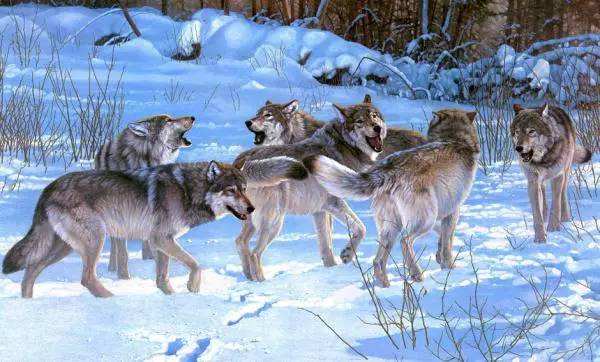(单词翻译:单击)
听力文本
This is Scientific American's 60-second Science, I'm Karen Hopkin.
This will just take a minute.
If you need help herding some sheep or retrieving a stick, you can count on your canine companion. Because dogs always seem to be keen on lending a paw. But only if their partner is a person. When it comes to cooperating with one another, dogs are truly lost...and instead it's wolves who've mastered the art of teamwork. That's according to a study in the Proceedings of the National Academy of Sciences.
For thousands of years, humans have been breeding dogs that can do all sorts of neat tricks. And because pups aim to please, we've come to think that domestication has somehow boosted dogs' powers of cooperation. But researchers in Austria have been wondering whether that notion could be barking up the wrong tree. Because left to their own devices, dogs are bigger loners than wolves.
"So wolves live in closely knit family packs, they cooperate in raising the young, they also cooperate in hunting and in defending their territories. So they really have a strong dependence on cooperation in many aspects of their lives. In contrast, to this free ranging dogs actually forage mostly by themselves solitarily. It's only mothers that raise their young. And they do form packs but they tend to be somewhat more fluid, if you want."

That's Sarah Marshall-Pescini of the Wolf Science Center at the University of Vienna. She and her colleagues decided to test dogs' and wolves' relative powers of cooperation. In the setup, a pair of animals...either two dogs or two wolves...is presented with a contraption that will allow the participants to access a tray of food...but only if both members of the team simultaneously pull on the two ends of a rope.
A dozen wolves and 14 dogs took the challenge. And the results? The wolves ran circles around their doggie descendants. In some 400 attempts, the wolf teams scored a snack 100 times. Which may not sound all that impressive...until you compare it with the doggie duos, who, in nearly 500 trials, succeeded only twice.
Now, it's not that dogs are less avid learners. Or that they turned tail and avoided the apparatus. Marshall-Pescini says the pooches were curious about the device.
"What seemed to be happening was they didn't want to get into conflict with each other. So they wouldn't both go and try things on it but rather took it in turns. And this really hindered their capacity to cooperate."
So rather than step on each others' toes, the hounds took turns bowing out, giving their teammate a chance at the plate. That show of social grace left the poor pups with their tummies growling. And no treat to wolf down.
For Scientific American — 60-Second Science. I'm Karen Hopkin.
参考译文
这里是科学美国人——60秒科学系列,我是凯伦·霍普金。
只需要一分钟哦。
如果你在放羊或捡回棍子时需要帮助,你可以依赖狗狗朋友。因为狗狗看起来总是乐于帮忙。但是,前提是合作对象是人类。在和同类合作时,狗狗会完全不知所措,而狼才是团队合作艺术的大师。这是《美国国家科学院学报》上刊登的一篇研究所提出的观点。
数千年来,人类一直在饲养可以掌握各种小技能的狗狗。因为狗的目的是取悦人类,所以我们认为驯养会以某种方式提高狗狗的合作能力。但是,奥地利研究人员一直想弄明白这种观念是不是弄错了。因为在自然成长的情况下,狗比狼更喜欢独来独往。
“狼生活在紧密团结的族群中,它们共同抚养后代,还一起捕猎和保护领地。所以,它们在生活的很多方面都对合作有很强的依赖性。相反,放养犬其实大多独处觅食。只有母犬养育后代。它们也会形成族群,但是可以说,它们的关系并不稳定。”
维也纳大学狼类科学中心的萨拉·马绍尔·佩希尼说道。她和同事决定测试狗和狼的合作相对功率。实验的设定是,在两只狗或两只狼的面前放置一个让它们可以获取一盘食物的奇特装置,但是只有团队中的两个成员同时拉住绳子的两端才能得到食物。
12只狼和14只狗接受了挑战。结果呢?狼的表现明显比狗好。在约400次测试中,狼组成功获得了100次食物。这听起来也许不算什么,那就和狗狗组的成绩比较一下吧,在近500次试验中,狗狗组只成功了2次。
这并不是说狗狗不热爱学习。它们也没有掉头就走并避开装置。马绍尔·佩希尼表示,狗狗对于这种装置充满了好奇。
“情况是,狗狗似乎并不想和对方发生冲突。所以,它们不会一起尝试,而是会轮流努力。而这阻碍了它们的合作能力。”
狗狗们并没有踩到对方的脚趾,而是轮流结束尝试,让队友也有尝试的机会。这种社交礼仪使可怜的狗狗肚子饿得咕咕叫。没有享受到可以狼吞虎咽的美食。
谢谢大家收听科学美国人——60秒科学。我是凯伦·霍普金。
译文为可可英语翻译,未经授权请勿转载!
重点讲解
重点讲解:
1. bark up the wrong tree 走错路线;搞错方向;想法不对路;
例句:Scientists in Switzerland realised that most other researchers had been barking up the wrong tree.
瑞士科学家意识到其他研究者大多研究方向不对头。
2. take turns/take it in turns 轮流;依次;
例句:We took turns to drive the car.
我们轮流开车。
例句:You can take it in turns to babysit.
你们可以轮流照看孩子。
3. bow out 退出;
例句:He had bowed out gracefully when his successor had been appointed.
他在继任者被任命后体面地引退了。
4. wolf down 狼吞虎咽地吃;
例句:He wolfed down the rest of the biscuit and cheese.
他把剩下的饼干和奶酪一扫而光。


